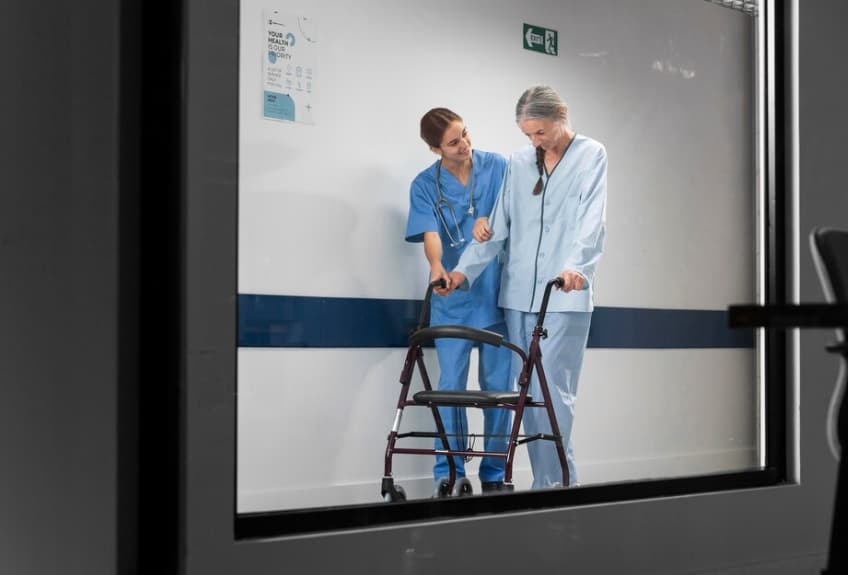Living with MSA can be challenging on many levels, from difficulty walking and talking to loss of bodily functions. But you are not alone in this journey. Exploring treatments such as stem cell therapy and staying informed about MSA can help manage and potentially reduce symptoms.
In this article, we break down what MSA is, how stem cell treatment for multiple system atrophy could help, and what one can expect from multiple system atrophy alternative treatments so you could feel more in control.
Understanding Multiple System Atrophy (MSA)
MSA affects approximately 5 out of 100,000 people. Let’s look deeper into this disease.
What Is MSA?
MSA is an extremely rare, progressive neurodegenerative disease of both the central and autonomic nervous systems. It has two main types:
- MSA-P, resembling Parkinson’s;
- MSA-C, also marked by lack of coordination and balance.
Symptoms typically begin in mid-adulthood, and the disease progresses rapidly to cause profound disability in daily life. There is currently no cure, and the latest treatments for MSA are focused on symptom management to improve comfort and functionality.
Symptoms and Stages of MSA
MSA can present with many varied symptoms, and these also vary greatly between individual cases:
Motor symptoms:
- Muscle rigidity, slowness of movement, and tremors;
- Difficulty maintaining balance and coordination, with an unsteady gait;
Autonomic dysfunction:
- A severe drop in blood pressure resulting in dizziness or fainting;
- Urinary urgency or incontinence;
- Impotence in men and a decreased libido in women;
Other symptoms:
- Sleep disturbances, REM sleep behavior disorder;
- Slurred speech;
- Memory disturbances.
The progression of MSA typically follows three stages, with patients often becoming wheelchair-bound within 5–6 years and having an average life expectancy of 10–11 years after diagnosis.
| Early Stage | Patients may experience mild imbalance or slight tremors. |
| Middle Stage | Movement and balance difficulties worsen, and autonomic symptoms become more severe, significantly impacting daily living. |
| Late Stage | Patients may require wheelchairs or assistance with daily activities. The disease progresses to impair breathing and swallowing, necessitating ventilation and tube feeding. |

Traditional Treatment Approaches and Their Limitations
Management in MSA is primarily symptomatic; hence, the main objective of medication use and multiple system atrophy alternative treatments is alleviation of symptoms to improve the quality of life in patients.
Symptomatic management
Pharmacological therapy is a standard treatment, but only about a third of patients experience a positive response, which typically diminishes over time. A common side effect is a drop in blood pressure.
Management of orthostatic hypotension
Midodrine and droxidopa can be used to manage low blood pressure while standing. Common side effects include supine hypertension and other cardiovascular complications.
Management of autonomic dysfunction
Associated autonomic symptoms, like bladder dysfunction, are treated with anticholinergic drugs or by catheterization. Among side effects are urinary retention or the risk of infections.
Physiotherapy
Physiotherapy may improve mobility and balance; however, its effectiveness can vary greatly between patients.
Limitations of current treatments
- None of the treatments currently available modify the course of MSA or stop its progression.
- Unfortunately, many patients poorly respond to the conventional treatments of diseases. This makes them frustrated and results in inadequate symptomatic medication.
- Medications usually have substantial side effects that seem to alter life quality.
Introduction to Stem Cell Therapy for MSA
Stem cell treatment for multiple system atrophy may facilitate the repair mechanisms of the body, slowing down the disease progression and improving the quality of life of patients.
How Stem Cell Therapy Works for Neurological Conditions
Treating multiple system atrophy with stem cell therapy helps ease this condition by various means.
Neuroprotection
The neuroprotective factors secreted by MSCs of the body, such as BDNF and GDNF, encourage the promotion of neuron survival, reduction of cell death, and support of healthy brain cells.
Immunomodulation
Managing multiple system atrophy with stem cell treatment helps regulate immune responses by reducing inflammation-causing cells and boosting anti-inflammatory factors. MSCs help create a better environment for brain repair and slow further neurological damage.
Stimulation of brain repair
Stimulation of brain repair through the secretion of trophic signals helps improve brain connectivity and function.
Angiogenesis
Managing MSA stem cell treatment can stimulate blood vessel growth in the damaged areas of the brain, improving the blood and nutrient supply. This is important for the recovery and health of the brain.
The Science Behind Stem Cells and MSA Treatment
Randomized clinical trial in patients with MSA-C has shown an improvement in neurological deficits in those receiving autologous MSC therapy, compared to the control placebo group, during a year of follow-up. This suggests that treating multiple system atrophy with stem cell therapy may help delay symptom progressions of MSA.
Success Stories: Real-World Examples of MSA Patients
Steve’s story gives hope for treating multiple system atrophy with stem cell therapy. He had undergone a clinical trial with the use of adult stem cells from his fat tissues. Steve noticed that his treatment helped delay the progression of his symptoms and returned to an active lifestyle, which was impossible before the stem cell treatment for multiple system atrophy.
Get a free online consultation
Feeling inspired by the success story of an MSA patient? It might be time to see if stem cell therapy can work for you too. Fill out the form for a free online consultation.

Medical Advisor, Swiss Medica doctor
Advantages of Stem Cell Therapy for Multiple System Atrophy
These are promising advantages that treatment with stem cell transplants for MSA holds for patients.
Slowing of Disease Progression
MSA treatment with stem cells helps preserve neuronal function and therefore gradually reduce the deterioration in motor and cognitive abilities, which may be the cause of delayed loss of independence and life quality.
Motor and Autonomic Function
Patients treating multiple system atrophy with stem cell therapy also show distinctive improvements in motor functions such as mobility and coordination, and also in regulating blood pressure and bladder control. This helps decrease dependency on supporting devices.
Improved Quality of Life
Managing MSA with stem cell treatment increases energy, enhances mood, and promotes better social interaction. It can reduce debilitating symptoms and help patients regain their independence to improve overall well-being.
Discover the full range of benefits that power stem cell treatments. Dive into our detailed article to uncover their incredible potential.
Explore hereHow Do I Choose a Reliable Clinic for Stem Cell Therapy for MSA?
You might be asking yourself, “Where can I get stem cell therapy for MSA?” Choosing a clinic with proven expertise is key for effective treatment. Swiss Medica stands out for its expertise in advanced stem cell therapy, offering personalized programs designed to support each patient’s unique journey toward improvement.
- We schedule a no-obligation online consultation with our experts to discuss your options for stem cell treatment for multiple system atrophy.
- Our MSA stem cell therapy all-inclusive package includes preparation before treatment, main therapy, comfortable accommodation, support after treatment, and alternative therapies for MSA like physiotherapy.
- We have a favorable doctor-to-patient ratio, hence individual care for every patient.
- Patients at our clinic enjoy comfortable accommodations, with a menu tailored to their preferences, all in a peaceful and welcoming atmosphere.
Swiss Medica now operates two clinics, one in Serbia and one in Slovenia, alongside a state-of-the-art five-building hospital in Belgrade, Serbia. This expansion allows us to provide a broader range of services to patients. Our convenient location makes it easy for international patients seeking advanced MSA stem cell therapy to access our care.
Swiss Medica provides a welcoming, supportive environment for MSA patients, offering specially designed therapy rooms and cozy apartments to ensure a calming, safe, and comfortable experience tailored to individual needs.
The Stem Cell Treatment Process for MSA: What to Expect
-
1
Consultation
Before starting stem cell treatment for multiple system atrophy, patients receive a comprehensive consultation with our doctors. This includes reviewing symptoms, medical history, and conducting neurological tests to assess neuronal damage.
-
2
Stem cell sources
Stem cells can be sourced from various origins, such as adipose tissue, umbilical cord tissue, neural stem cells, or bone marrow stem cell transplants for MSA. These cells are processed in our in-house laboratory under strict quality control measures to ensure safety and viability.
-
3
Delivery methods
Stem cells are administered via intrathecal injection (into the spinal canal) or intravenous infusion, depending on the patient’s specific needs. Immediate side effects are closely monitored during and after administration.
-
4
Follow-up
Progress after MSA treatment with stem cells is tracked through clinical exams and imaging. Patients often notice symptom improvements several weeks or months after treatment.
Explore the unique features and benefits of neural stem cells—check our article to learn more details.
Read nowSafety and Complications of Stem Cell Treatment for MSA
Patients may experience some minor side effects following stem cell treatment, including reactions at the injection sites, fever, and fatigue. These symptoms are usually mild and temporary and often resolve on their own without the need for medical intervention.
Swiss Medica maintains all the safety measures in order to avoid any risks during the treatment with stem cell transplants for MSA:
- We assess the case history of each patient in detail to determine if t stem cell therapy is appropriate.
- Stem cells are extracted from donors in sterile, germ-free environments to avoid contamination.
- Quality and viability testing at each stage of processing serve as key control points for the stem cells.
Cost of Stem Cell Therapy for MSA and Insurance Information
The cost of stem cell transplants for MSA can vary greatly depending on the geographical region, type of stem cells, and treatment protocol. In the United States, costs typically range from $20000 to $35000 per session, though more affordable options that do not compromise on quality exist in countries like Serbia. The Swiss Medica stem cell treatment for multiple system atrophy costs between €7,000 and €31,000*, based on the treatment program and additional procedures.
Because the overwhelming majority of insurance plans do not currently cover stem cell therapy for multiple system atrophy, patients usually pay out-of-pocket.
*The prices mentioned are indicative and subject to change based on individual factors, including the condition’s severity and the number of stem cells needed. Prices are valid as of January 2025.
Comparing Stem Cell Therapy with Other MSA Treatments
Medications vs. Stem Cells: Which Offers Better Results?
Traditional drugs like levodopa and dopamine agonists help reduce symptoms of MSA but do little to slow disease progression. In contrast, stem cell therapy, especially MSCs, may not only manage symptoms but also slow down the disease’s progress.
Combining Therapies for Maximum Effectiveness
Combining stem cell treatment for multiple system atrophy with immunotherapy, anti-inflammatory treatments, or deep brain stimulation (DBS) could lead to better motor function and improved quality of life.
Lifestyle Changes and Rehabilitation as Complementary Approaches
Additionally, doctors may recommend multiple system atrophy alternative treatments like physical therapy, occupational therapy, and regular exercise to maintain mobility, build strength, and improve overall health. Proper nutrition can help manage symptoms and support recovery after treatment.
Considering ways to enhance your stem cell therapy results?
Discover complementary therapies that can help improve outcomes.
Future of Stem Cell Therapy for Multiple System Atrophy
Latest Research and Clinical Trials
Recent studies show promise for stem cell transplants for MSA. One trial with autologous MSCs showed slower neurological decline compared to a placebo. Another study using intrathecal mesenchymal stem cell therapy in multiple system atrophy found that higher doses helped delay disease progression, suggesting stem cell therapy could be effective for MSA.
Innovations in Stem Cell Treatment Technologies
Advances in stem cell technology have made the latest treatment for MSA much safer and more effective. Improved methods now allow for better stem cell isolation, expansion, and delivery—especially with intrathecal injections that directly target the central nervous system for more precise stem cell treatment for multiple system atrophy.
What the Future Holds for MSA Patients
The latest treatments for MSA offer hope, with ongoing research focused on making protocols more effective and expanding their clinical use. Each new trial brings us closer to establishing stem cell therapy as a treatment that could slow disease progression and improve quality of life. Advances in personalized medicine also mean treatments can be tailored to each patient, helping them receive the most effective care.
Frequently Asked Questions About Multiple System Atrophy Stem Cell Cure
1. What improvements can stem cell therapy bring?
Stem cell therapy for MSA may slow down the progression of neurological decline and improve symptoms like bladder and bowel control, movement, and overall quality of life. While results vary, most patients report significant improvements in daily function.
2. Is stem cell therapy safe for MSA?
Stem cell therapy is generally considered safe, with no serious side effects reported in clinical settings. Although mild and short-term side effects like injection site reactions or fatigue, may still occur.
3. Can stem cells cure MSA?
Stem cells cannot cure MSA, but they may help manage the disease. New treatments for multiple system atrophy with stem cells, especially with MSCs, can slow down disease progression and improve motor and autonomic symptoms, enhancing quality of life.
Send a request
Wondering if stem cell therapy could help manage your condition? Fill out the form for a free online consultation.

Medical Advisor, Swiss Medica doctor
List of References
Goh YY, Saunders E, Pavey S, et alMultiple system atrophyPractical Neurology 2023;23:208-221.
National Institute of Neurological Disorders and Stroke. (n.d.). Multiple system atrophy. Retrieved November 13, 2024, from https://www.ninds.nih.gov/health-information/disorders/multiple-system-atrophy
Flabeau O, Meissner WG, Tison F. Multiple system atrophy: current and future approaches to management. Ther Adv Neurol Disord. 2010 Jul;3(4):249-63. doi: 10.1177/1756285610375328. PMID: 21179616; PMCID: PMC3002658.
Svendsen, S.P., Svendsen, C.N. Cell therapy for neurological disorders. Nat Med 30, 2756–2770 (2024). https://doi.org/10.1038/s41591-024-03281-3
Yu H, Yuan X, Liu L, Wang T, Gong D. Treatment of multiple system atrophy – the past, present and future. Am J Clin Exp Immunol. 2018 Oct 5;7(5):88-94. PMID: 30498625; PMCID: PMC6261842.
Rahimi Darehbagh, R., Seyedoshohadaei, S.A., Ramezani, R. et al. Stem cell therapies for neurological disorders: current progress, challenges, and future perspectives. Eur J Med Res 29, 386 (2024). https://doi.org/10.1186/s40001-024-01987-1
Lee PH, Lee JE, Kim HS, Song SK, Lee HS, Nam HS, Cheong JW, Jeong Y, Park HJ, Kim DJ, Nam CM, Lee JD, Kim HO, Sohn YH. A randomized trial of mesenchymal stem cells in multiple system atrophy. Ann Neurol. 2012 Jul;72(1):32-40. doi: 10.1002/ana.23612. PMID: 22829267.
Hachimi-Idrissi S. Stem cell therapy in neurological disorders: promises and concerns. Explor Neuroprot Ther. 2023;3:346–62. https://doi.org/10.37349/ent.2023.00055
Park, KR., Hwang, C.J., Yun, HM. et al. Prevention of multiple system atrophy using human bone marrow-derived mesenchymal stem cells by reducing polyamine and cholesterol-induced neural damages. Stem Cell Res Ther 11, 63 (2020). https://doi.org/10.1186/s13287-020-01590-1
Lee, H. J., Kim, H. J., Kim, Y. J., Lee, S. H., & Lee, J. Y. (2014). Effects of mesenchymal stem cell therapy on longitudinal changes in subcortical deep gray matter volumes and cortical thickness in patients with multiple system atrophy. Frontiers in Aging Neuroscience, 6, Article 118. https://doi.org/10.3389/fnagi.2014.00118
Singer W, Dietz AB, Zeller AD, Gehrking TL, Schmelzer JD, Schmeichel AM, Gehrking JA, Suarez MD, Sletten DM, Minota Pacheco KV, Coon EA, Sandroni P, Benarroch EE, Fealey RD, Matsumoto JY, Bower JH, Hassan A, McKeon A, Windebank AJ, Mandrekar JN, Low PA. Intrathecal administration of autologous mesenchymal stem cells in multiple system atrophy. Neurology. 2019 Jul 2;93(1):e77-e87. doi: 10.1212/WNL.0000000000007720. Epub 2019 May 31. PMID: 31152011; PMCID: PMC6659003.
ABC7 New York. (2023, December 3). Chris Barr: Paralyzed man who can walk again shows potential benefit of stem cell therapy. Retrieved from https://abc7ny.com/chris-barr-paralyzed-man-who-can-walk-again-shows-potential-benefit-of-stem-cell-therapy/14607258/
MD, Pediatrician, Regenerative Medicine Specialist









